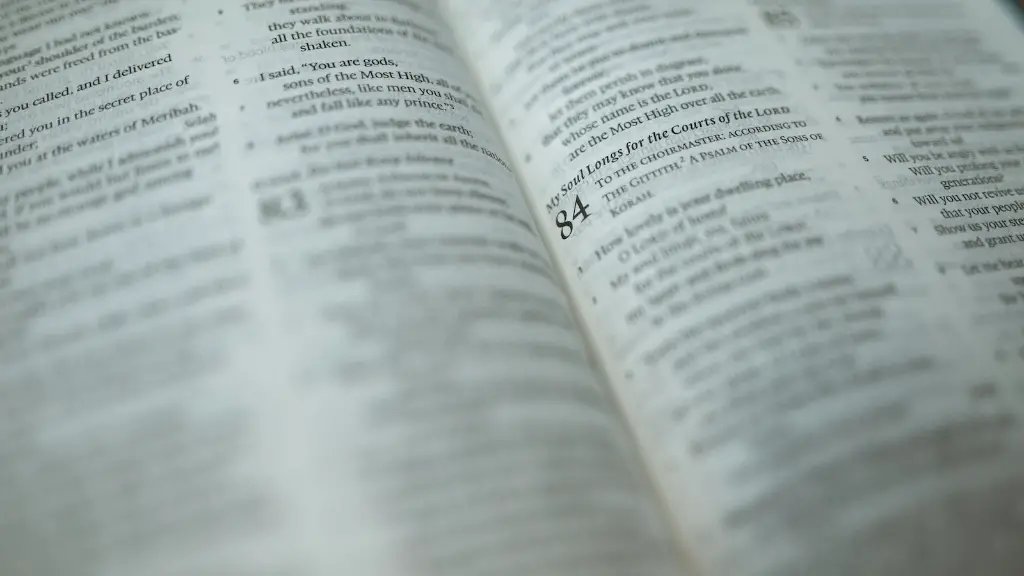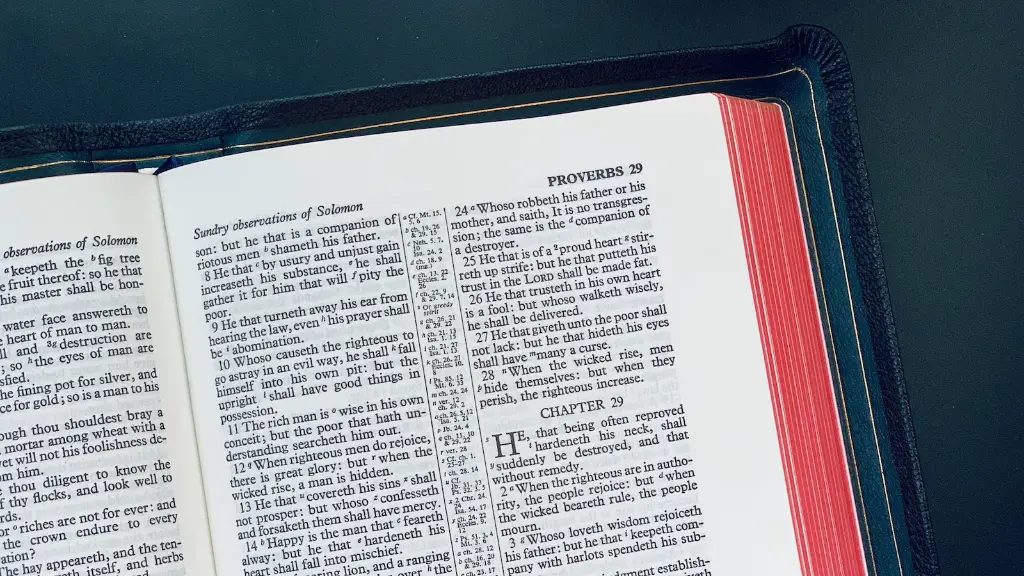There has been much debate over the centuries about whether the Bible was actually changed throughout the years. This age-old debate is as alive today as it was many centuries ago, and it is a complicated and fascinating one to explore. To get to the bottom of this contentious issue, we need to examine the evidence from ancient manuscripts, the history of textual transmission, and the traditional view of the Bible.
When it comes to ancient manuscripts, a substantial amount of manuscripts – including Hebrew, Aramaic, Greek, and Latin – have been discovered over the years. These have enabled scholars to accurately compare and contrast different biblical texts, as well as compare existing texts with earlier versions. The comparison of different texts has revealed noticeable differences, which has been used to argue that the Bible was changed over the years.
In terms of the history of textual transmission, it is believed that some of the first texts of the Bible were written down by scribes in Jerusalem, who were responsible for writing down the Hebrew Bible in its original language, as well as translating it into Greek and Aramaic. From there, the texts were then passed down through the generations, with scribes diligently copying the text accurately. However, it is argued that these versions were deliberately copy edited and altered by scribes in order to suit their own beliefs and biases.
The traditional view of the Bible is that it is a set of books compiled over centuries, with various authors and editors contributing to the overall text. According to this view, some degree of editing was inevitable and not necessarily a cause for alarm. Others would argue, however, that this type of editing has resulted in an entirely different set of beliefs from what was originally written in the Bible, and this is a cause for concern.
The truth is that it is impossible to say definitively whether the Bible was modified over the years. However, the evidence from ancient manuscripts, the history of textual transmission, and the traditional view of the Bible point to a complex history, with some degree of alteration to the text. It is important, therefore, to consider all evidence carefully and make an informed judgement about this contentious issue.
The Accuracy of Bible Manuscripts
The accuracy of Bible manuscripts has been a source of debate for centuries. On one side of the debate are those who argue that Bible manuscripts have been accurately preserved through the centuries, with no textual variations. On the other side are those who point to differences between different manuscripts and argue that the Bible has been changed over time. To understand this debate, it is important to consider both sides.
The argument that Bible manuscripts have been accurately preserved can be supported by looking at the work of ancient scribes. Many of these scribes were committed to copying the Bible accurately and presented their work as faithful reproductions of the original texts. In addition, modern scholarship has enabled scholars to accurately compare different manuscripts and spot differences between them. This has provided us with an accurate and reliable source of information about the accuracy of Bible manuscripts.
The other argument is that Bible manuscripts have been altered over time. Those who make this argument often point to some textual variations between different manuscripts, as well as the intentional copy editing of some scribes. This can be seen as a form of intentional adulteration of the text, although it is also worth noting that some of these changes may have been made in order to make the text more readable or easier to understand.
It is impossible to definitively say whether the Bible has been changed over the years, although the evidence from ancient manuscripts, the work of scribes, and the scholarship on the subject suggest that there has been some degree of alteration. It is important to consider both sides of the argument, though, in order to make an informed judgement about the accuracy of Bible manuscripts.
The Origin of Bible Changes
The origin of any changes to the Bible is a complex and contested topic. While some argue that the changes were made by scribes, others believe they were made by editors. In order to understand the origin of Bible changes, it is important to consider both theories.
The first theory is that changes were made by scribes. This is based on the work of scribes, who were responsible for faithfully reproducing the texts that make up the Bible. While some scribes may have been more diligent than others, the great majority of scribes appear to have strived to accurately reproduce the text, which suggests that any changes were made inadvertently rather than intentionally.
The second theory is that changes were made by editors. According to this theory, editors were responsible for making changes to the text, either intentionally or unintentionally. There is evidence to suggest that some editors did indeed make deliberate changes to the text in order to fit their own preferences or beliefs. It is also possible, though, that some changes were accidental, either through carelessness or through an attempt to make the text more readable.
The truth is that we may never know for certain whether changes were made by scribes or editors. All we can do is examine the evidence and make an educated guess. Whatever the source of the changes, though, it is clear that there has been some form of alteration to the texts of the Bible over the years.
Modern Translations of the Bible
Modern translations of the Bible are largely based on ancient manuscripts and the work of early scribes and editors. These translations are generally considered to be faithful reproductions of the original text, although some scholars have argued that some modern translations of the Bible contain changes that were not present in the original text.
The argument that modern translations are not faithful reproductions of the original is based on the fact that modern translations are the product of editors and translators working in the modern world. These people may be influenced by their own beliefs and biases, and it is possible that this could be reflected in some modern translations of the Bible. As such, it is important to consider this possibility when looking at modern translations.
Despite this, modern translations of the Bible are generally considered to be reliable. Scholars have gone to great lengths to compare different versions of the Bible, and modern translations are largely in agreement with the ancient manuscripts. This suggests that the majority of modern translations are faithful to the original, although it is still important to be aware of any discrepancies between a modern translation and the original texts.
At the end of the day, it is impossible to say definitively whether the original texts of the Bible were changed over the years. However, it is clear that there is some evidence of change, and it is worth considering this evidence carefully in order to make an informed judgement.
The Impact of Bible Changes
The impact of any changes to the Bible is often hotly contested. On one side of the debate, some argue that the changes are purely superficial and have no impact on our understanding of the text. On the other side, there are those who argue that the changes have significantly altered the original message of the Bible.
Those who argue that the changes are simply superficial usually point to the minor variations between different manuscripts, as well as the fact that modern translations and ancient manuscripts generally agree. This suggests that any changes are simply matters of style or emphasis, and have no real impact on the overall message of the Bible.
On the other side, there are those who believe that the changes have had a significant impact on our understanding of the Bible. This argument is based on the fact that some ancient manuscripts have been heavily edited, as well as the fact that some modern translations differ significantly from the original text. As such, it is argued that the changes have resulted in an altered version of the Bible with a different underlying message than the original.
It is impossible to definitively say whether changes to the Bible have had an impact on our understanding, although it is clear that there is some evidence to suggest that this has been the case. It is important to consider all evidence carefully in order to make an informed judgement about this contested issue.
The Debate Over Bible Changes
The debate over whether the Bible has been changed over the years is an ongoing one, and it is unlikely that a definitive answer will be found anytime soon. On one side of the debate, there are those who argue that any changes to the Bible have been minor and have not had a significant impact on our understanding of the text. On the other side, there are those who argue that the changes have been significant and have altered the original message of the Bible.
Those who argue for minimal changes usually point to the fact that ancient manuscripts agree with modern translations, as well as the fact that any changes appear to be minor and superficial. On the other hand, those who argue for significant changes point to the variations between different manuscripts, as well as the work of scribes and editors who deliberately altered the text.
At the end of the day, it is impossible to say definitively whether changes were made to the Bible over the years. However, the evidence suggests that some changes have occurred, and it is important to consider all evidence carefully in order to gain an informed perspective on this contentious issue.





